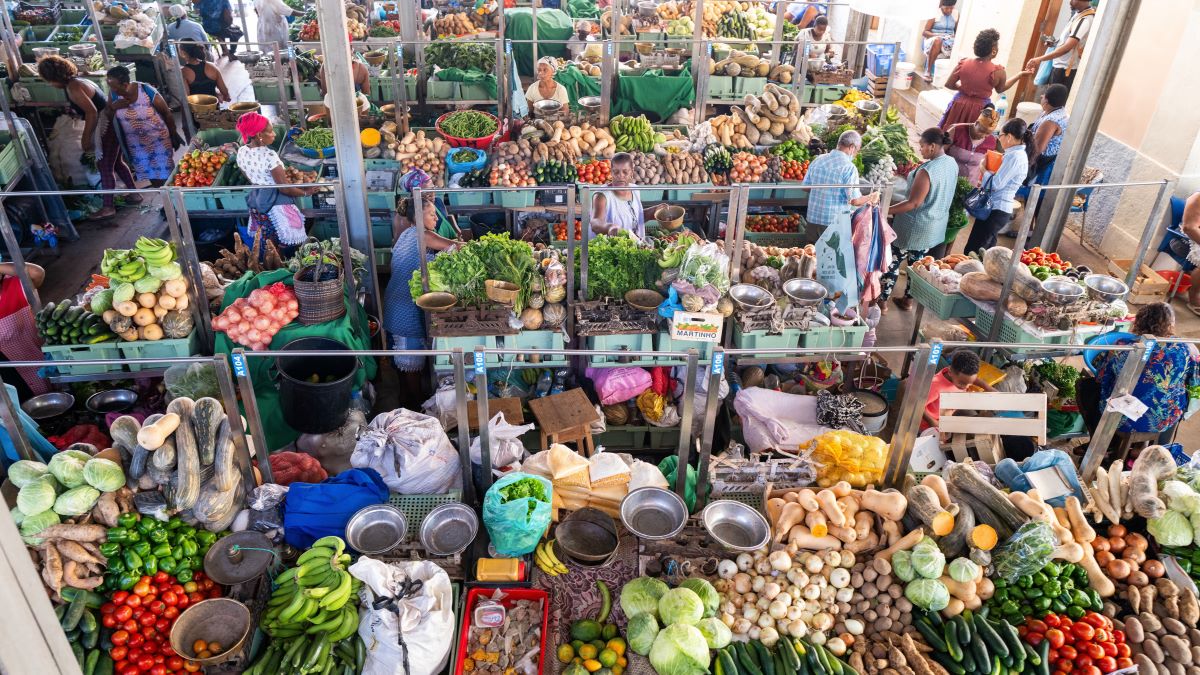Boosting competition in food markets is crucial to tackling unfair practices, reducing prices and building food systems that can meet rising global demand.
© Shutterstock/Pierre Laborde | A food market in Sao Vicente, Cabo Verde.
Fair and competitive food markets are crucial to achieving a world without hunger, a fundamental goal of the 2030 Agenda for Sustainable Development.
The agrifood sector has seen rising market concentration in recent years. Through mergers and acquisitions, a handful of large multinational corporations have come to dominate global food value chains.
In the grains market, for example, the top four companies control between 70% to 90% of global trade.
Similarly, in sectors like agrochemicals, animal pharmaceuticals, seeds, farm equipment and synthetic fertilizers, the four largest firms hold a combined market share that ranges from 33% to 65%.
Recent UN Trade and Development (UNCTAD) meetings with governments, researchers and experts have highlighted how competition law and policy can tackle unfair and monopolistic practices.
Why competition matters in food markets
Global food systems involve a range of players, including farmers and producers, input providers, processors, exporters, logistics partners, sellers and consumers.
Competition can drive innovation and efficiency, benefiting everyone, says Teresa Moreira, head of UN Trade and Development’s competition and consumer protection branch.
“When companies and farms compete, they strive to improve their techniques, resulting in higher quality products with more variety, sustainable practices, higher yields and lower costs that can increase aggregate surplus across each value chain,” Ms. Moreira says.
Competition can also help reduce the costs of agricultural inputs like fertilizers and seeds, making food more affordable.
Competition authorities in action
Competition law and policy can redress market power abuse and unfair trade practices.
In Austria, for example, the federal competition authority (AFCA) launched investigations into vertical price fixing in the food sector, where powerful retailers attempted to control resale prices, harming small and medium-sized producers.
Following around 50 unannounced inspections, known as “dawn raids”, the AFCA concluded 27 cases, resulting in nearly €70 million in fines. The authority also devised guidelines on resale price maintenance in 2022.
In Kenya, the competition authority (CAK) recently found that a large supermarket chain had abused its buyer power over suppliers, leading to fines and required amendments to contract clauses that facilitated such abuse.
Similarly, in South Africa, the competition authority settled a cartel case involving margarine and edible oils, issuing fines against companies involved.
Need for ‘pro-poor’ policy and legislation
Experts at UN Trade and Development meetings have underscored the need for “pro-poor” competition policies and legislation to address significant bargaining imbalances within and between countries.
Such policies would help create a level playing field where small businesses, which often employ or are owned by poorer individuals, can compete fairly against larger companies, and mitigate the effects of exploitative practices that disproportionately harm them.
To promote such considerations and ensure robust law enforcement, UN Trade and Development calls for stronger international cooperation in line with the United Nations set of principles on competition (The UN Set).
As the lead agency on competition issues within the UN system, UN Trade and Development advocates for fighting against anti-competitive practices, empowering smaller market players and protecting consumers to foster fairer and more inclusive trade practices.
The organization also provides a platform for sharing information and best practices while supporting developing countries to refine competition policies specific to the agrifood industry.

